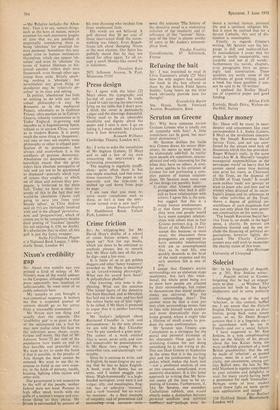Crime friction
Sir: As whipping-boy for Mr David Hare's dislike of a school of crime fiction writers, may I speak up? Not for our books, which are there to be criticised as anybody pleases, but to remark that Mr Hare falls into all the pits he digs—and a few over.
It is futile of us to get golden daggers and other 'fancy weaponry' awarded us. Mr Hare is described as an 'award-winning playwright'. What can his award have been? A polyethylene phallus?
Our knowing, arty tone is dis- pleasing. What can the sentence 'The actual figure of the detective has been bleached, and re-bleached, has laid out in the sun, and has had the colour burnt out of him' right- ly be called, if Mr Hare is prepared to argue that it is neither knowing nor arty? Mr Auden's judgment about Raymond Chandler is 'arch and
presumptuous.' In the next phrase we are told that Ray Chandler 'was by any standard a great poet.' The author of a work entitled Slag is never. never arch, and can- not conceivably be presumptuous. Is Mr Hare very young? He is somewhat vain, and alarmingly vul- nerable.
Since he is anxious to write. and in English, he must forgive my say- ing that he has to learn English. A book, even by Sartre, has no arms, and I cannot snuggle into them. 'High-humouredly' is a high- handed neologism, even were it not vulgar, silly, and meaningless. Eng- lish has an adjective 'resonant' and a verb 'resound' but no word `to resonate'. As a final example of turgidity, and of pretentious and resounding—even resonant—noth-
sense the sentence 'The history of the detective novel is a continuing criticism of the insularity and ir- relevance of the "serious" litera- ture of the time' is almost worthy of entry in Mr Auden's common- place book.
Nicolas Freeling Grandfontaine, 67 Schirmeck, France


































 Previous page
Previous page